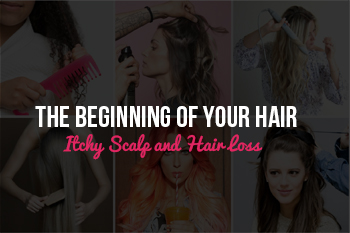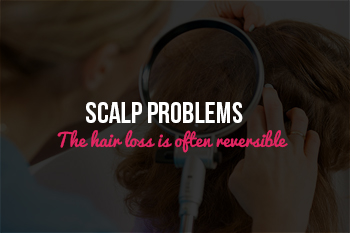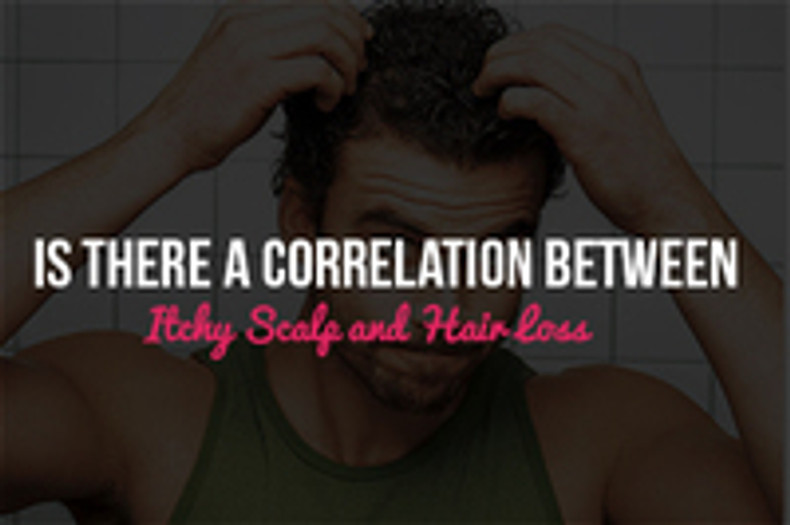 Hair loss and itchy scalp are both uncomfortable situations that could be causing you to have problems with how happy you are with your hair. There can certainly be a correlation between the way that your scalp itches and not having the head of hair that you want to have. Continue reading to learn more about how your hair grows and how problems with your scalp, like itching, can impact how much hair you currently have growing on your head.
Hair loss and itchy scalp are both uncomfortable situations that could be causing you to have problems with how happy you are with your hair. There can certainly be a correlation between the way that your scalp itches and not having the head of hair that you want to have. Continue reading to learn more about how your hair grows and how problems with your scalp, like itching, can impact how much hair you currently have growing on your head.
Hair Science
To understand the correlation between having an itchy scalp and hair loss, it can be helpful to understand how your hair grows on your scalp.
The Beginning of Your Hair
Your hair gets its start when you are still a baby as your hair follicles are all formed before you are even born. At 22 weeks, a fetus will have all of the follicles that a person will have over their entire lifetime already formed on their body. Most people have around five million follicles that are located everywhere on your body. There are one million of those follicles located on your head, and about one hundred thousand of those are located on your scalp. The rest of the follicles are your facial and body hair. Although your body hair and scalp hair are different, they are formed in the same way. You may assume that since your hair has seemed to get thinner as you aged that you're in danger of hair loss, but that is just happening because of the difference in the space between your follicles since your scalp was getting bigger as you got bigger. This doesn’t mean that you shouldn’t learn all you can about implementing safeguards to keep your hair healthy and full in case you are dealing with a scalp condition.
 Since before you were born, you had all of the follicles that will ever be on your body, it is a good idea to do everything that you can to do your best to protect your hair and your scalp from harm. Follicles that are blocked or clogged up will not be able to function properly. That means that they will not be able to go through the hair growth process to produce new hair for your head or that the hair that is coming from that follicle is not as healthy as it should be.
Since before you were born, you had all of the follicles that will ever be on your body, it is a good idea to do everything that you can to do your best to protect your hair and your scalp from harm. Follicles that are blocked or clogged up will not be able to function properly. That means that they will not be able to go through the hair growth process to produce new hair for your head or that the hair that is coming from that follicle is not as healthy as it should be.
Formation of Hair
The follicles are vital to the formation of your hair, and since they are located in your scalp, it can be helpful to understand how hair is formed. This may help you when it comes to dealing with annoying scalp issues that may lead to hair loss. Your hair is comprised of the hair follicle and the hair shaft. The follicle in your scalp acts like a home for your growing hair as it provides it a place to stay rooted in and gives it nourishment from your scalp. There are tiny blood vessels located in your scalp that feed the root of your hair. This living part of the hair shaft is called the bulb and is the part of your body that has the cells that divide the fastest. This is great because it means that your hair is going to grow at a pace that can be noticed. The follicle offers two sheaths that protect the hair along with forming it as it grows.
The hair shaft that can be seen above your scalp is just keratin, which is a protein, and at this point, your hair is no longer alive as it was down inside the follicle. The shaft is comprised of three layers called the medulla, cortex, and cuticle.
Scalp Oil Can Be Good
 All too often you hear about a person having really greasy hair from too much oil or not enough oil that makes their hair too dry. That adage about everything in moderation is true when it comes to the natural oil of your scalp. One of the sheaths that are located in your scalp ends right underneath your sebaceous gland which produces this natural oil. There is a muscle called the erector pili muscle that is attached below the gland to the other portion of the sheath that makes your hair stand up. This also helps the sebaceous gland to secrete sebum or this natural oil on your scalp and hair. This might sound gross, but it is actually a natural conditioner. Often, your itchy scalp may have something to do with the amount of oil on your scalp and hair, so understanding that you don’t want to strip this oil from your head or have way too much is a good starting point for how itchy scalp correlates to hair loss.
All too often you hear about a person having really greasy hair from too much oil or not enough oil that makes their hair too dry. That adage about everything in moderation is true when it comes to the natural oil of your scalp. One of the sheaths that are located in your scalp ends right underneath your sebaceous gland which produces this natural oil. There is a muscle called the erector pili muscle that is attached below the gland to the other portion of the sheath that makes your hair stand up. This also helps the sebaceous gland to secrete sebum or this natural oil on your scalp and hair. This might sound gross, but it is actually a natural conditioner. Often, your itchy scalp may have something to do with the amount of oil on your scalp and hair, so understanding that you don’t want to strip this oil from your head or have way too much is a good starting point for how itchy scalp correlates to hair loss.
Scalp Problems
There are some scalp problems that can cause itch and that can lead to hair loss. The good news is that typically these are easy to treat conditions that are not too medically serious and that the hair loss is often reversible from these conditions.
Some conditions that can cause an itchy scalp include:
- Dandruff: This is usually when you have a lot of flakes that show up on your shoulders, head, and neck. Most often this is from a skin condition called eczema, but may also be from a fungal infection, hormones, of the changes of the season. This may be easily cleared up with a shampoo, but if not, you may want to visit your doctor to find the cause of your dandruff.
- Psoriasis: This is a skin condition that is not contagious. It is a problem that will cause your skin to grow in thick patches that are often white, red, or silvery. Your doctor can offer you several types of treatment to handle this skin condition to get your scalp to a more normal level of skin growth.
 Seborrhea: This is another form of eczema, and is often caused by your scalp glands producing too much oil. This will be a rash that is reddish with a crust that is greasy and yellow. There are creams that will treat this condition. This is often seen in infants and is called cradle cap.
Seborrhea: This is another form of eczema, and is often caused by your scalp glands producing too much oil. This will be a rash that is reddish with a crust that is greasy and yellow. There are creams that will treat this condition. This is often seen in infants and is called cradle cap.- Lichen Planus: This is a more uncommon condition, and often happens to people that are feeling stressed out or very fatigued. It may also be caused by chemical or medicine exposure. This is one to see your doctor about for treatment.
- Folliculitis: This condition is an infection of your hair follicle and shaft. Your doctor may prescribe you an antibiotic or antifungal medication to deal with a severe infection.
- Impetigo: This is a bacterial skin infection that can be treated with antibiotics.
- Contact Dermatitis: An allergic skin reaction can also cause your scalp to itch, and you will certainly want to find out what product you are allergic to when it comes to preventing this from occurring again.
- Skin Cancer: Cancer is pretty scary to see on this list, but skin cancer on your scalp can cause itchiness. Areas that are not protected by hair or having fine hair that allows hair to be exposed to the sun can often see this condition. This is why it’s so important to remember to use sunscreen on your head or cover up with a hat. There may be a sore, growth, or mole that causes irritation, and should be checked out by your doctor to make sure that this is not the cause of your problem.
Itchy Scalp and Hair Loss
 Combining these two previous topics can help to better inform you of how itchy scalp can correlate to hair loss in a few ways. For one, your scalp is having to deal with the impact of your itchy scalp. This means that the skin may be too dry or have too much oil. Your hair follicles can be blocked by the dead skin that is being itched or by scales from dandruff or psoriasis. Your scalp is unable to do its job right because of the health of the scalp. Healthy hair needs a healthy base to grow from to look its best. Another reason that an itchy scalp can correlate to hair loss is that you are probably finding it hard not to scratch your head because of the discomfort of your scalp. This scratching may be damaging your scalp, which can in turn also damage the hair that is currently growing and the follicle itself.
Combining these two previous topics can help to better inform you of how itchy scalp can correlate to hair loss in a few ways. For one, your scalp is having to deal with the impact of your itchy scalp. This means that the skin may be too dry or have too much oil. Your hair follicles can be blocked by the dead skin that is being itched or by scales from dandruff or psoriasis. Your scalp is unable to do its job right because of the health of the scalp. Healthy hair needs a healthy base to grow from to look its best. Another reason that an itchy scalp can correlate to hair loss is that you are probably finding it hard not to scratch your head because of the discomfort of your scalp. This scratching may be damaging your scalp, which can in turn also damage the hair that is currently growing and the follicle itself.
How to Help
You may be wondering what your takeaway should be from this article, and the main thing to remember is that you want your hair to have the best-growing environment possible. Think of a garden. It is prepared for plants growing by adding all the necessary nutrients, and conditioning the soil to be perfect for the roots. You want to do the same for your scalp. This means treating any conditions that are causing you to have a problem with itching. You can always try medicated shampoos, but seeing your doctor may help you to better diagnose what you have going on with
your scalp, which will help you to start seeing your hair loss reverse sooner. Then, you need to remember to eat healthy to keep those hair bulbs happy and use products designed to work with your scalp’s chemistry.

